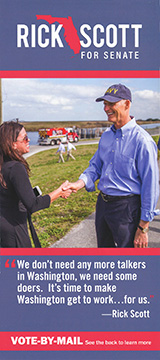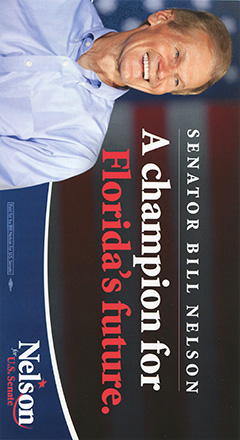- Main
Page « 2018
Senate Races «
Florida
Senate
| FLORIDA |
Nov. 6,
2018 U.S. Senate |
|
Plurality: 10,033 votes (0.12 percentage points). FL
Secretary of State
REPUBLICAN PICK-UP Notes: The race between Sen. Bill Nelson (D), seeking a fourth term (first elected in 2000), and Gov. Rick Scott (R) was one of the most closely watched in the country and was the most expensive Senate race in American history. It did not end on Election Day, going through an a contentious recount process. In addition to his 18 years in the Senate, Nelson, age 76, served three terms in the Florida House (elected 1972, '74 and '76), six terms in Congress (first elected in 1978), ran for governor in 1990, and was Florida treasurer and insurance commissioner. Scott is the former chief executive of Columbia/HCA, the for-profit health care company; he was elected governor in 2010 and re-elected in 2014. Several hurricanes affected the Florida races. Hurricane Michael, one of the strongest hurricanes to hit the continental U.S., made landfall in the Panhandle on Oct. 10, 2018, causing immense damage. (The hurricane did not, as some had hoped, clear the red tide problem which has affected many Florida beaches (>)). Hurricane damage posed major challenges for election administrators. Hurricane Maria, which devastated Puerto Rico a year earlier, in Oct. 2017, pushed thousands of displaced Puerto Ricans to Florida. They joined many islanders who had left previously due to the territory's troubled economy. The only debate occurred on Telemundo 51/WSCV in Miramar on Oct. 2 (>). A second debate had been scheduled for CNN in Tampa on Oct. 16 but was postponed due to the hurricane and then cancelled when the candidates could not agree on a date. According to the Center for Responsive Politics a total of $204.4 million was spent ($114.3 million by the campaigns and $90.0 million in outside spending) (>). Ad Age reported that $128.5 million of that was spent on advertising. Scott could well be said to have bought the seat as he contributed $63.6 million to his campaign. [In the last report before Election Day, Oct. 17, the number was a mere $51.0 million]. All told, the Scott campaign reported receipts of $84.5 million and disbursements of $82.8 million; by comparison the Nelson campaign reported receipts of $33.6 million and disbursements of $31.5 million. (Other mega-self-financing candidates have not fared as well; Linda McMahon contributed more than $90 million to her unsuccessful runs for U.S. Senate in Connecticut in 2010 and 2012; Meg Whitman holds the record at $144 million on her 2010 campaign for governor of California). Florida TV viewers saw a lot of political ads. The Wesleyan Media Project reported that through Oct. 25 Orlando was the top media market in the country in ad airings in federal and gubernatorial races and Tampa was number three (>); according to those figures, more ads were run in the governor's race than for Senate by a ratio of 1.4: 1. More than 2.6 million Floridians voted by mail and more than 2.7 million voted early (>). Unofficial returns showed Scott ahead of Nelson by 12,562 votes or 0.15 percent of the 8.1 million votes cast. Florida statutes (TItle IX, Chapter 102 Conducting Elections and Ascertaining the Results) require a machine recount if "the unofficial returns reflect that a candidate for any office was defeated or eliminated by one-half of a percent or less of the votes cast for such office [102.141(7)]; if that recount finds "a candidate for any office was defeated or eliminated by one-quarter of a percent or less of the votes cast for such office...a manual recount of the overvotes and undervotes cast in the entire geographic jurisdiction of such office or ballot measure shall be ordered" [102.166(1)]. Some observers suggested that poor ballot design in Broward County, a Democratic stronghold, may have cost Nelson thousands of votes, if not the election. On the Broward ballot, the Senate race appeared at the bottom of a column after a long list of voter instructions, while the governor's race was at the top of the next column. In Broward, there were 24,975 fewer votes in the Senate race than the governor's race (684,601 vs. 709,576 votes). Looking at the five most populous counties and the statewide numbers, the difference does appear anomalous, although whether Scott benefited and if so by how much would require further analysis: Votes Cast in
Governor and U.S. Senate Races
On Nov. 10 Sec. of State Ken Detzner ordered a full machine recount for three statewide races: Governor, U.S. Senate and Agriculture Commissioner. The deadline for counties to complete the recount and submit results to the Department of State was Nov. 15 at 3 p.m.. (Broward and Palm Beach Cos. did not meet the deadline, meaning their initial unofficial results were tallied). The machine recount increased Scott's lead slightly to 12,603 votes. Per statute, Detzner ordered a manual recount of ballots with under-votes and over-votes. The manual recount put Scott's margin at 10,033 votes (0.12 percentage points), and Nelson conceded on the afternoon of Nov. 18. Throughout the recount process, the Scott campaign adopted a rather strident attitude, while the Nelson campaign was more restrained in its public response (+). President Trump weighed in on Scott's behalf as well. In a postscript, on Dec. 4, Scott announced he would serve out his full term as governor, through Jan. 8, rather than resigning on Jan. 3 to take his Senate seat. That would have elevated Lt. Gov. Carlos Lopez-Cantera to serve for a few days. The net result is that Scott will have the least seniority of the new Senators. Campaign Manager: Bill Nelson: Marley Wilkes (March 2018) Executive director at Ruth's List Florida from 2015; the group seeks to recruit, train, and support Democratic pro-choice women candidates. Co-finance director on Alex Sink's gubernatorial campaign. Deputy campaign manager on Nelson's 2012 campaign and also worked on his 2006 campaign. Rick Scott: Jackie Schutz Zeckman (April 2018) Chief of staff (from July 2017), communications director (Dec. 2014-July 2017), deputy communications director (May-Nov. 2014), press secretary (Oct 2012-May 2014) and deputy press secretary (Sept. 2011-Oct. 2012) to Gov. Scott. Account executive at CoreMessage, Inc., Oct. 2009-Aug. 2011. M.Sc. in politics and communications from the London School of Economics, 2009; B.S. in political science from Florida State University, 2008. |
ADVERTISEMENT



